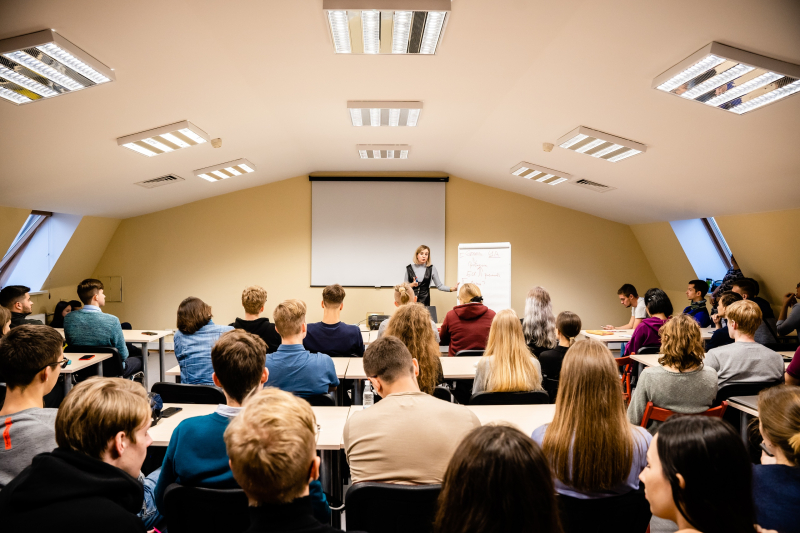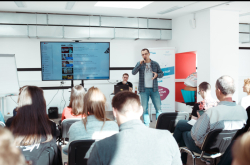What drives an entrepreneur?
Daria Khelshtein is not only a soft skills professor – in particular, public speaking and storytelling – but also an entrepreneur with over 13 years of experience and two successful businesses.
The workshop brought together over 60 Bachelor’s and Master’s students. Daria started her presentation by stressing the importance of finding the right motivation and incentive – a great resource for getting engaged in such a complex and unstable field as entrepreneurship. Sometimes, it is even more important to understand your reasons and prospects than have an actual business idea.
Whether it is a need for self-realization, recognition, personal freedom, comfortable and wealthy living, or a way to embody world-changing global ideas or to turn your passion into profit – it does not matter what exactly drives aspiring entrepreneurs. What’s important is to figure it out for yourself and make it your starting point.
The three pillars of success
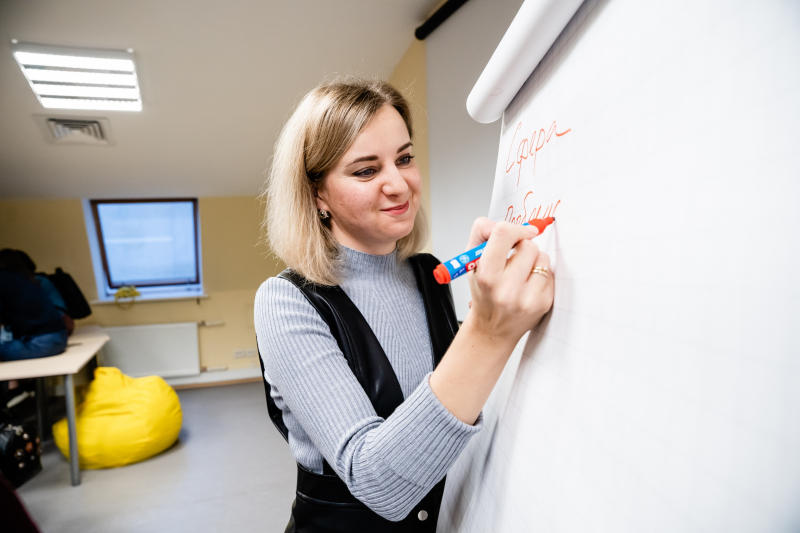
The process of generating ideas consists of three steps. Firstly, you need to decide on a field for your future business. The best way is to choose the field that you are already interested in. If you read biographies of prominent people and dive into the cases of the most successful companies, you will find out that oftentimes it all started with a specific dream, enthusiasm, and interest.
The second step is to search for a problem specific to this field: the needs of your audience. And, finally, take a look at the offers already existing on the market. Here, your main task is to decide what you can offer, what makes it unique, and how it will attract a prospective audience.
Another way to participate in the search for relevant ideas is to analyze the existing market and discover a currently vacant niche. In this case, it is helpful to turn to your own experience and reflect: what is it that you lack, and what do you have problems or difficulties with in your day-to-day life?

With all this, as Daria emphasized, social businesses have recently become the most popular field – that is, the one that solves the real problems of poverty, ecology, health, vulnerable groups of the population, and so on. Socially responsible businesses are the future and soon no business without a social component will be able to advance on the international market. Even now, it is in high demand, it pays off well, and already existing businesses are trying to adapt to new standards and realities. So now, before starting a business you need to think over its value in society.
Brainstorming
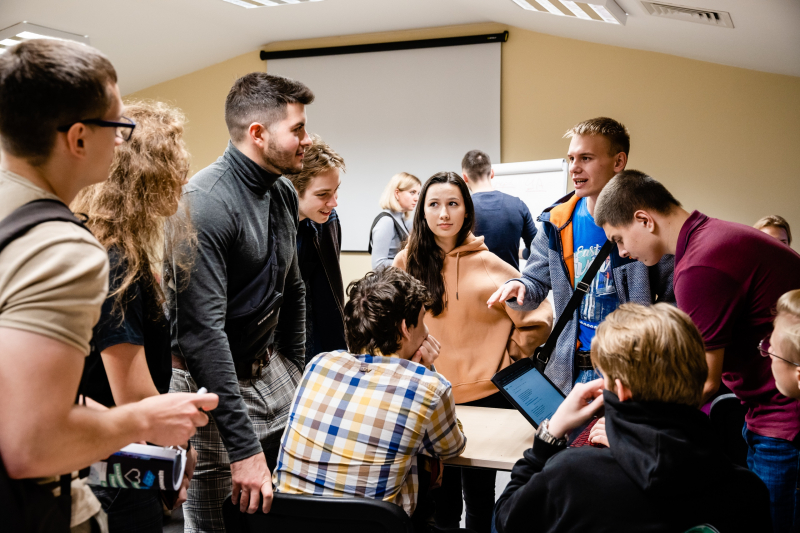
The second part of the event was practice-oriented: the students were divided into several teams, and each team was responsible for one of the economy’s fields. Before starting work, Daria, as a coordinator, gave the students a pep talk. Firstly, do not be afraid to share your ideas, even if they seem silly, because out of a dozen delusional proposals, one will definitely be valuable. Secondly, every business idea must have a social component: how exactly this solution can help people or the outside world. And thirdly, when presenting your hypotheses, you need to take questions from the audience seriously as these will help clarify in which direction you can develop your idea further.
As a result, the students formed eight teams and presented their projects aimed at solving the problems of ecology, foodtech, education, finance, and IT. That’s how a noise-charged power bank was invented. It is based on a vibrating membrane that vibrates under the influence of sounds and generates electricity. In the future, the same technology can be implemented in the Western High-Speed Diameter: such membranes allow not only to illuminate the highway but also to charge electric vehicles.
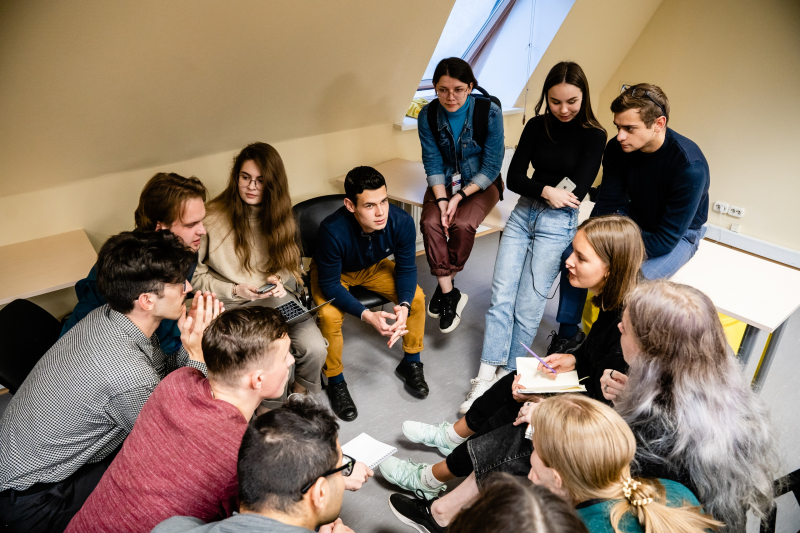
Another global project was the solution to the hunger problem and lack of drinking water in Africa. The students came up with a full-cycle system based on solar panels, ocean water filtration, and the hydroponic method of growing vegetables.
One of the teams brought up a highly relevant yet little-discussed topic – the disposal and recycling of food containers. Many, especially during quarantine, switched to the delivery of ready-made food, which most often uses difficult-to-recycle or non-recyclable packaging such as foil and complex combinations of plastic. The students proposed a solution to the problem in two stages: collecting empty containers by the delivery service itself and encouraging customers with additional discounts, and using biodegradable packaging like cellulose. Another eco-friendly proposal was the use of sapropel from drained reservoirs as vermicompost and a replacement for harmful fertilizers – phosphates and nitrates. So, according to them, that’s what can solve the problem of soil depletion and harmful products.
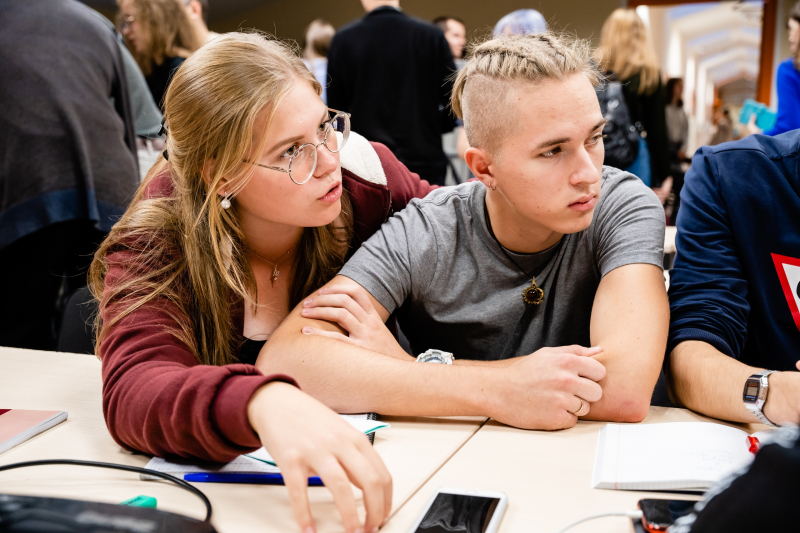
As many as two projects were devoted to education. One of them is a platform for finding international opportunities with a flexible selection system, up-to-date filters (for example, for a partial or full scholarship, language tests, and points required for admission), and individual approaches. Another project is related to augmented reality technology, which will animate information from a textbook – for example, show scenes of historical battles or visualize concepts from physics. They think that it will help students to learn much more effectively.
The workshop’s playful approach appeared to be quite effective as teams managed to come up with great ideas for the Preaccelerator.
